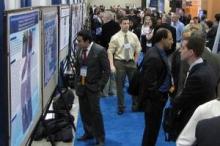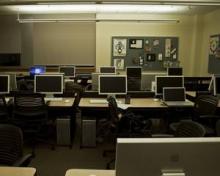They are thronged with excited doctors who can hardly restrain themselves from pointing out statistics and conclusions, all the while balancing plates of food and glasses of wine (like the Cat in the Hat and his famous multitasking adventure with Meg and the goldfish).
Here scientists are able to be themselves – taking pictures of friends proudly displaying their "babies," unconcerned about microphones, uninhibited by the formality of speaking before a crowd, congratulating the sharp conclusion, questioning the flawed method, and pushing for the truth.
The sessions are deservedly popular – a crowd focused on having fun through the whirlwind of group mind. One question leads to another and another — with both investigators and listeners saying, "Wow, I hadn't thought of that."
And then there's the ritual exchange of cards – the face-to-face interchange that forges new relationships. I hear it all the time: "I'm going to email you some data I think you can really use." And, "I'm working on something similar – lets get together later and see how we can work together."
Nothing beats seeing a light bulb switch go off for someone: "Wow, I have a patient with EXACTLY this issue! I'm going to go home and give this a try!"
In a nutshell, it's what medicine is all about – standing on someone else's shoulder to grab the formerly unreachable.
From a purely selfish perspective, these sessions often make for great stories. Attendees ask questions that would never have croseds my mind, and - whether relaxed by the convivial atmosphere or the free goodies - everyone is in a generous "information-sharing" mood that I, as a journalist, don't always encounter.
Contrast that to the digital poster sessions at the summer meeting of the American Academy of Dermatology.
There's the requisite big, cavernous room.
Subtract the papers on the wall, quadruple the number of empty computers, and you have some idea of the AAD's poster session at the summer meeting in Chicago.
There's a central podium with a TV screen for displaying the posters.
There are rows and rows of computers, each with a chair in front.
And 90% of them are empty.
I visited twice yesterday, both times when an investigator I wanted to meet was scheduled to present.
Once I was alone in the room.
Another time, there was a doctor who told me it was the second "session" he’d attended – neither of which was graced by the author of the scheduled poster.
"I asked about it at the registration desk," he said. "I was told it’s not mandatory for the presenter to attend. People can come in here any time and view all of the posters on screen." The proctor in charge of the room told me only one presenter had shown up all day – and no one was there to hear her speak.
The poster system was easy enough to navigate. It brought up the poster in a series of PDF images. There was even a link to email the presenter – after you input all the data you get a message saying "Thank you. Your email will be delivered after the meeting concludes."
In almost 10 years of medical reporting, this is the first 100% digital poster session I’ve attended, and I have to say it was a little sad.
I realize "green" is the new byword of our society – and computer presentations save on printing costs. But nothing can replace the human element of group mind – the electric conflagration that happens when the 10 trillion neurons in one brain start firing in tandem with 100 trillion more – and that's just when 10 people are discussing the same work.
Don't we all spend too much time hunched over our computers in solitary pursuit of knowledge? Aren't you beginning to miss the human interaction that forms the basis of society, or scientific advancement, or religious theory, or the creation of community?
– Michele G. Sullivan



